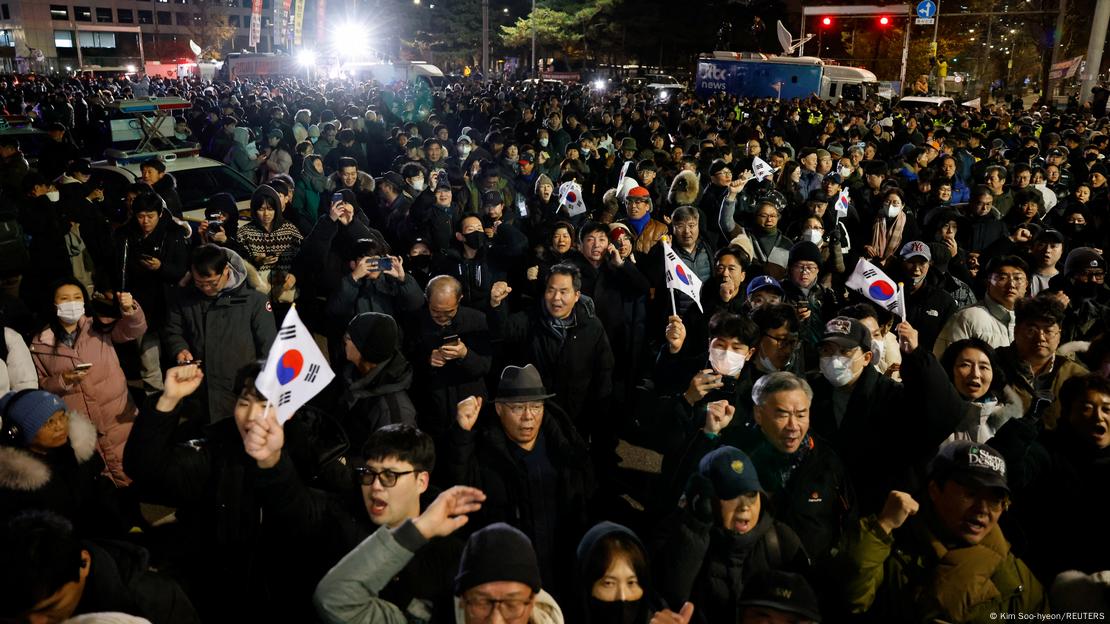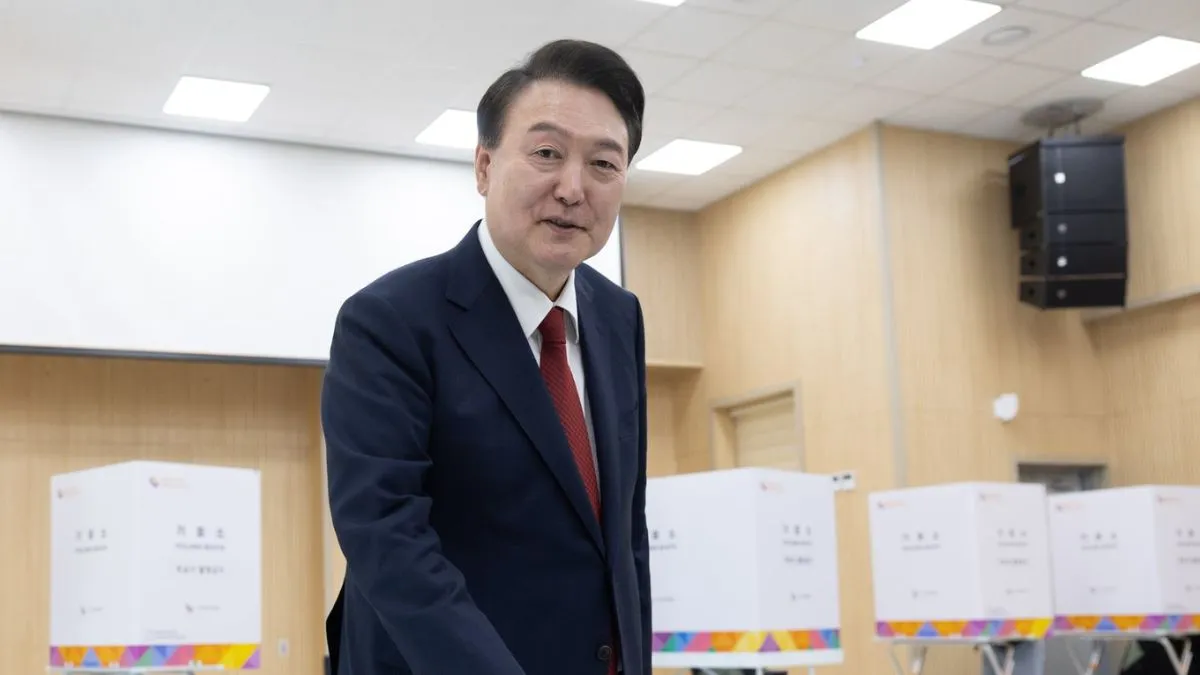- By Priyanka Koul
- Tue, 03 Dec 2024 11:19 PM (IST)
- Source:JND
For the first time in 44 years, the South Korean government has declared martial law. President Yoon Suk Yeol made the announcement on Tuesday, stating that he would "eliminate anti-state forces" pushing the country toward "the depths of national ruin."
Martial law refers to military control during an emergency and can include the suspension of normal civil rights. Live footage from local news stations showed soldiers attempting to enter South Korea's National Assembly building, while lawmakers and parliamentary aides attempted to block them by spraying fire extinguishers, according to Reuters.
LIVE: South Korea's National Assembly after president declares martial lawhttps://t.co/hLCnB4N0Jv
— Reuters (@Reuters) December 3, 2024
Lawmakers have subsequently decided to block the president's move, after both the ruling and opposition parties promised to oppose the issuance of the order. The speaker of parliament called the martial law notification unconstitutional, and parliamentarians voted early Wednesday to reject it.
Within two and a half hours of declaring martial law, South Korea's demand for the lifting of martial law was passed. pic.twitter.com/c5XrayI7uW
— Tsla Chan (@Tslachan) December 3, 2024
However, South Korean military officials have stated that martial law will stay in effect until President Yoon Suk Yeol decides to lift it, despite the parliament's overwhelming vote against it, according to AFP.
The military officials in Seoul confirmed that the martial law will "remain in place until the president removes it," as reported by the news agency, citing local broadcaster YTN and other media outlets.
Tanks rolling into Seoul as emergency martial law in effect. https://t.co/d2JEECqpEc pic.twitter.com/DhSmhkmGLs
— Breaking911 (@Breaking911) December 3, 2024
In his evening address, President Yoon accused opposition parties of holding the country’s legislative process hostage. He said they were working against the government and pushing the nation into a crisis. Yoon made it clear that he had no choice but to take such extreme measures to maintain constitutional order and protect the state.
Soon after the announcement, protests erupted outside the parliament building, with crowds chanting, "Withdraw emergency martial law!"
#BREAKING
— Intelligence FRONT (@intelligencefnt) December 3, 2024
⚡️🇰🇷 People in South Korea have taken to the streets to protest against the declaration of martial law. pic.twitter.com/MyFItOKmsx
The government also stated that parliamentary functions and political activities would be suspended. Media outlets—across TV, radio, print, and digital platforms—are now under the control of the martial law command. Yoon did not point to any external threats from North Korea, but his focus was instead on the opposition’s attempts to undermine his administration. This marks the first time martial law has been enforced in South Korea since 1980.
Also Read: Eknath Shinde Accepts Maharashtra Deputy CM Post As Talks With Devendra Fadnavis End Stalemate
Following the announcement, the South Korean won fell sharply against the US dollar. In response, officials from the central bank said they were prepared to intervene in the market if necessary. Finance Minister Choi Sang-mok convened an emergency meeting to discuss the economic situation
Why Did South Korea Declare Martial Law?
The late-night announcement, shown on national television around 11 pm (14:00 GMT), first caused many to fear it was in response to North Korea, South Korea's nuclear-armed neighbour, or a severe national security issue, such as terrorism or a coup. However, Yoon said that the measure was important to maintain South Korea's free and constitutional order. He accused opposition parties of "holding hostage" the parliamentary process, putting the country into crisis.
🇰🇷🚨‼️ SUMMARY OF THE CRAZY EVENTS IN SOUTH KOREA:
— Lord Bebo (@MyLordBebo) December 3, 2024
1) The president of South Korea expected an impeachment from the opposition.
2) To prevent that, he declared martial law banning all political activity!
3) The Korean army came and closed off the parliament to prevent MPs to… pic.twitter.com/Ez5UcQutFR
Though, it quickly became clear that Yoon had declared martial law in reaction to a succession of political problems. After losing control of parliament earlier this year, his government faced a slew of opposition bills and motions aimed at undermining his leadership, according to a BBC report. Political analysts believe Yoon was motivated to declare martial law as an undemocratic tactic to counter political criticism.
Also Read: Over 6.69 Lakh SIM Cards Blocked And 59,000 Fraud Accounts Shut Down By MHA
What Does Martial Law Mean for Citizens?
- Total Prohibition on Political Activities: All political activities are banned, including those in parliament (National Assembly), local councils, political parties, rallies, protests, and demonstrations. Political associations and affiliations are also prohibited.
- Complete Control of the Media: Media across all platforms—print, radio, broadcast, internet, and social media—are now under the scrutiny and control of the Martial Law Command.
- Total Ban on Protests and Rallies: Protests, rallies, and strikes are prohibited. Any actions that could lead to social chaos or incite violence are banned.

Image Credits: Reuters
- Misinformation Punishable: Any attempt to deny or overthrow the liberal democratic system is prohibited. Propaganda, misinformation, disinformation, fake news, and public manipulation are punishable offenses.
- Medical Staff Orders: All doctors, medics, nurses, and other medical personnel, including trainees (both in service and retired), must return to the medical field within 48 hours and follow instructions from the relevant authorities. Those who refuse will be punished in accordance with martial law.
- Enemies of the State: Any anti-state or subversive forces will be dealt with under martial law.
- Impact on Ordinary Citizens: Ordinary citizens may face measures that minimize disruptions to their daily lives. Those who violate martial law orders may be subject to arrest, detention, and searches without warrants. Violators will be punished under Article 14 of the Martial Law Act (Penalties).

